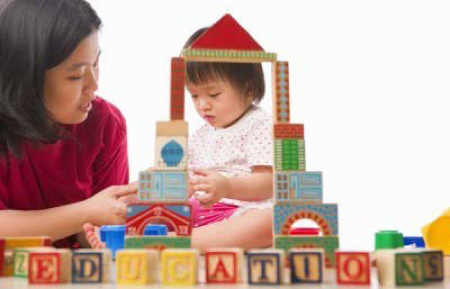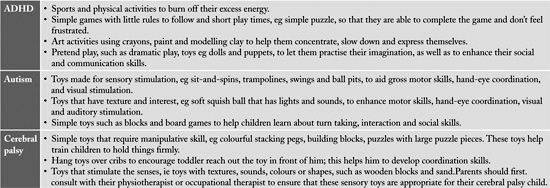Play is essential to kids, but has an even more vital role in children with special needs, that is to stimulate their development and learning.
In fact, play has been utilised by some professionals to assist them interact with children and to help children express their feelings and emotions. Play therapy has also been used as part of effective intervention programmes, such as early intervention, speech therapy, parent management therapy, family-centred intervention with children experiencing a broad range of behavioural and physical disorders, such as language disorders, conduct disorders, attention deficit hyperactivity disorder (ADHD), autism and cerebral palsy.
Various play materials (eg toys, art materials) and methods are utilised in play therapy, which is usually provided and guided by trained professionals. At home, parents are strongly encouraged to use play as a medium to build positive parent-child relationship, and to support their child’s development in vocabulary abilities, communication skills, social skills and problem-solving skills.
Why Play?
ADHD – Children with ADHD have short attention span, and are hyperactive and impulsive. The symptoms of this behavioural disorder make it hard for the children to focus on and complete a task. ADHD children often have tough times concentrating in the classroom and socialising with children of the same age. Engaging in appropriate play and activities help an ADHD child to develop better focus attention, gain self-confidence, and learn to socialise and interact properly with other children. In addition, play time also serves as an opportunity to foster warm and positive parent-child relationship, which is often strained due to the symptoms of the disorder.
Autism – Autistic children have extreme difficulty connecting themselves to other children in ordinary ways. They prefer to play alone, become obsessed with objects and get absorbed in their own world. They are also less able to recognise emotional expressions and social cues, thus affecting their social-communication development.
Play that focuses on the child’s interest and that encourages interaction can help improve their communication and interpersonal skills.
Cerebral palsy – Cerebral palsy is an inborn condition that affects the muscle tone, movement and motor skills, causing stiffness, movement difficulties and involuntary movements. Children with cerebral palsy experience a certain degree of physical inability. Simple tasks, such as standing still or grasping objects, can be difficult for them.
They may not be readily engaged in play, but they need to play to develop their gross and fine motor skills, as well as for their sensory development.
Suitable play and toys for children with special needs
| ADHD |
|
| Autism |
|
| Cerebral palsy |
|






